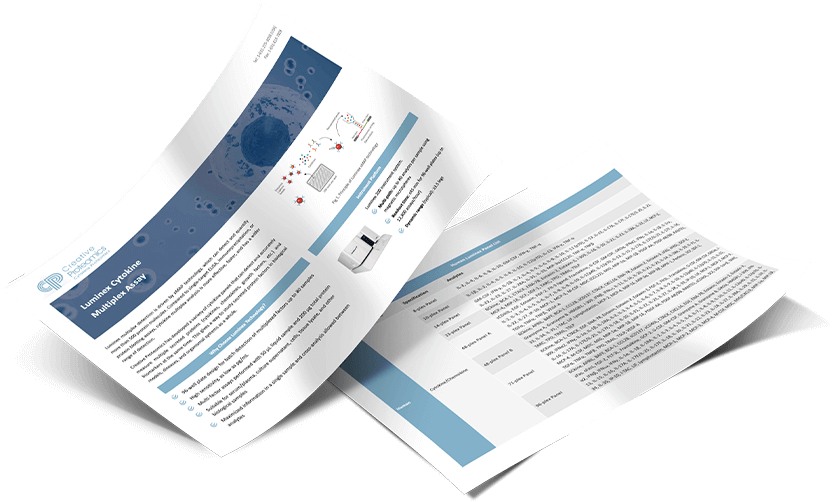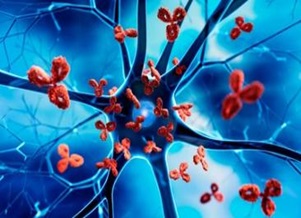Disease Biomarker Research
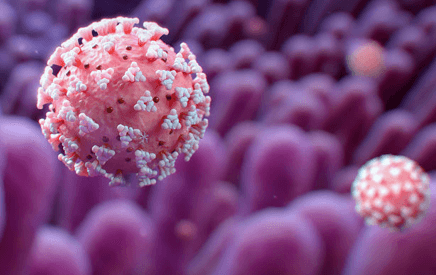
Cytokines, as molecules of signal transduction between cells, mainly mediate and regulate immune response and inflammatory response, stimulate hematopoietic cell production and repair tissue damage. Under normal circumstances, the expression and secretion of cytokines are strictly regulated by the body. Under pathological conditions, cytokines will be abnormally expressed. Therefore, the detection of cytokines is of great value for research on the mechanism, treatment or drug development of certain diseases. Compared with other types of infection and inflammatory disease testing methods, cytokine detection has the advantages of non-invasiveness and low cost, and has been used as an inflammatory marker for the diagnosis of many diseases.
Biomarkers are indicators that can judge the occurrence, development and prognosis of diseases. They play an important role in early diagnosis, disease prevention, drug target confirmation, and drug response research. Biomarker analysis can in-depth elucidate the mechanism of action or resistance mechanism of new drugs in disease models.
Creative Proteomics primarily utilizes Luminex xMAP technology for cytokine and other protein marker assays. We will select the right combination of technologies for your project to meet your various needs and help researchers obtain higher quality scientific data.
What we can provide:
- Cytokine and Biomarker Detection: Quantify cytokines, inflammatory factors, chemokines, and enzymes to assess immune responses and disease states. Key analytes include IL-1β, IL-6, IL-8, TNF-α, and IL-10.
- Protein Analysis: Conduct quantitative analysis of phosphorylated proteins and apoptosis-related markers, focusing on critical proteins involved in cell signaling and apoptosis, such as ERK, STAT3, and caspases.
- Signal Pathway Research: Investigate cellular signal pathways like MAPK, NF-κB, and JAK/STAT to understand cellular responses and mechanisms, aiding in drug target identification and pathway modulation research.
- Disease Progression Monitoring: Track cytokine and biomarker changes related to disease onset, progression, and resolution, supporting patient stratification and therapeutic evaluation for conditions such as cancer, autoimmune diseases, and cardiovascular disorders.
- Drug Development Research: Evaluate the impact of new drugs on cytokine and biomarker profiles, assisting in preclinical and clinical trial support, drug efficacy and safety evaluation, and pharmacodynamics studies.
- Biomarker Discovery: Identify novel biomarkers associated with diseases or therapeutic responses through high-throughput cytokine profiling and exploratory studies, facilitating early disease detection and personalized medicine.
Platform for Disease Biomarker Assay
We mainly provide the Luminex cytokine detection platform. Luminex uses fluorescently encoded microspheres with specific antibodies to different target molecules. The different microspheres can be combined freely to a certain extent so that up to 100 analytes can be tested multiple times simultaneously in a single experiment.
The Luminex cytokine assay platform has the following advantages:
- Multiple detection: simultaneous detection of 100 biological targets
- Short experiment time: 1-3 weeks
- High sensitivity: the lower limit of accurate quantification is as low as 0.1 pg/mL
- Save samples: only need a sample volume as low as 25 μL
- Time saving: the experiment process only takes 4 hours
For your different needs, we can also provide the following detection methods:
- Flow cytometry (FACS analysis): Highly sensitive fluorescent labeling and detection system. Flow cytometry can detect two or more cytokines in the same cell at the same time. It can also distinguish cytokine secreting cell subgroups based on cellular immune phenotype. No tissue culture is required, and whole blood analysis is possible. No need to separate PBMCs.
- Enzyme-linked immunosorbent assay (ELISA): Use the primary antibody for capture, and conjugate the secondary antibody with an enzyme or radioisotope for detection. Our multiplexing system can detect the expression of multiple cytokines at once.
Cancer Cytokines/Protein Assay
Objective: Evaluate tumor progression and immune response.
Our assays measure key cytokines such as IL-6, IL-10, TNF-α, and IFN-γ. By analyzing these markers, we provide insights into tumor behavior, stage, and treatment efficacy, enabling personalized therapeutic strategies.


Cytokine Storm Assays
Objective: Detect and monitor severe inflammatory responses.
We assess a comprehensive panel of cytokines, including IL-1β, IL-6, IL-8, and TNF-α, to identify and evaluate cytokine storms associated with conditions like COVID-19. This helps in early detection, severity assessment, and response to treatments.
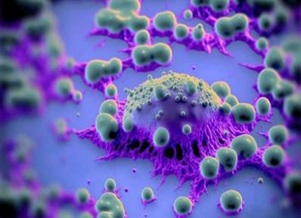
Inflammation Cytokines Assay
Objective: Assess systemic inflammation and treatment effectiveness.
We use Luminex technology to measure inflammation-related cytokines like IL-1β, IL-6, IL-8, and TNF-α. This profiling supports accurate inflammation assessment and helps optimize anti-inflammatory treatments.
Rheumatoid Arthritis Cytokines/Protein Assay
Objective: Monitor disease activity and therapeutic responses.
Our assays detect key cytokines including IL-1, IL-6, TNF-α, and IL-17, providing insights into joint inflammation and damage. This supports personalized treatment plans and evaluation of therapeutic efficacy.
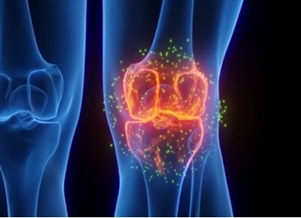
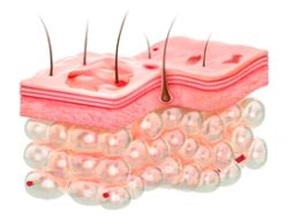
Atopic Dermatitis Cytokines/Protein Assay
Objective: Explore disease mechanisms and treatment impacts.
We measure cytokines such as IL-4, IL-13, and IL-31, which are involved in allergic inflammation and skin barrier dysfunction. This analysis aids in developing targeted therapies and monitoring disease progression.
Osteoporosis Cytokines/Protein Assay
Objective: Understand bone resorption and remodeling.
Our assays focus on cytokines like RANKL, OPG, and IL-6, providing insights into bone health and treatment effects. This helps in early diagnosis, disease monitoring, and assessing therapeutic impact.
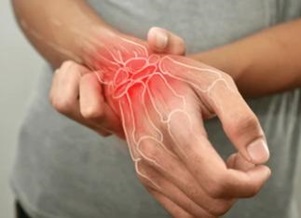

Apoptosis Cytokines/Protein Assay
Objective: Investigate cell death processes in various diseases.
We detect cytokines related to apoptosis such as TNF-α and Fas ligand. This analysis helps understand cell death mechanisms and evaluate potential therapeutic strategies.
Diabetes Cytokines/Protein Assay
Objective: Explore inflammation’s role in diabetes management.
Our assays measure cytokines like IL-1β, IL-6, and TNF-α, which are involved in insulin resistance. This supports understanding of disease mechanisms, monitoring progression, and evaluating therapeutic responses.

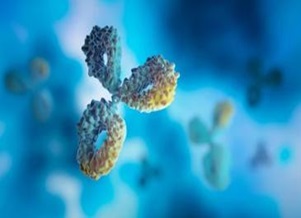
Immunomodulatory Cytokines Assay
Objective: Assess immune system regulation and response.
We analyze cytokines such as IL-10, TGF-β, and IL-12 to understand immune modulation. This aids in optimizing immunotherapies and monitoring immune system changes.
Hypertension Cytokines Assay
Objective: Link inflammation to blood pressure regulation.
Our assays detect cytokines like IL-6, TNF-α, and IL-1β, associated with hypertension. This helps identify biomarkers, monitor disease progression, and assess treatment impacts.
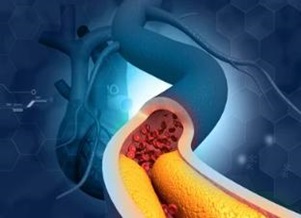
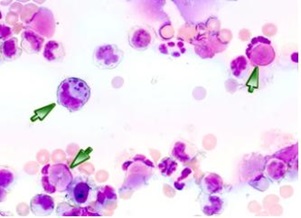
Systemic Lupus Erythematosus Cytokines Assay
Objective: Monitor disease activity and therapeutic responses.
We measure cytokines such as IL-6, IFN-α, and TNF-α to provide insights into SLE’s autoimmune and inflammatory processes. This supports personalized treatment and monitoring of disease progression.
Cardiovascular Disease Biomarker Assay
Objective: Understand inflammation’s role in cardiovascular risk.
Our assays detect biomarkers like IL-6, TNF-α, and C-reactive protein (CRP), which are associated with cardiovascular inflammation. This aids in early diagnosis, risk stratification, and treatment evaluation.

Our analysis is not limited to the diseases listed above, please contact us if you would like to inquire about analysis of markers related to other diseases.
Species
Sample Requirements for Disease Biomarker Assays
| Sample Type | Recommended Volume | Storage Conditions | Transport Conditions |
|---|---|---|---|
| Serum | 200-500 µL | -80°C | On dry ice |
| Plasma | 200-500 µL | -80°C | On dry ice |
| Saliva | 500 µL - 1 mL | -80°C | On dry ice |
| Cell Culture Supernatant | 200-500 µL | -80°C | On dry ice |
| Whole Blood Cells | 1-2 mL | -80°C (for short-term) | On dry ice (if immediate) |
| Peripheral Blood Mononuclear Cells (PBMCs) | 1-2 mL | -80°C or in cryopreservation medium | On dry ice |
| Mouse Immune Cells | 1-2 mL | -80°C or in cryopreservation medium | On dry ice |
| Lymph Node Tissue | 50-100 mg | -80°C or in tissue preservation solution | On dry ice or in preservation medium |
| Bone Marrow Aspirate | 200-500 µL | -80°C | On dry ice |
| Synovial Fluid | 200-500 µL | -80°C | On dry ice |
| Urine | 500 µL - 1 mL | -80°C | On dry ice |
| Cerebrospinal Fluid (CSF) | 200-500 µL | -80°C | On dry ice |
| Amniotic Fluid | 200-500 µL | -80°C | On dry ice |
| Tissue Homogenates | 50-100 mg | -80°C or in tissue preservation solution | On dry ice or in preservation medium |
| Fecal Extracts | 500 µL - 1 mL | -80°C | On dry ice |
| Sweat | 200-500 µL | -80°C | On dry ice |
| Breast Milk | 500 µL - 1 mL | -80°C | On dry ice |
FAQ
What is the benefit of using Luminex xMAP technology for my research?
How accurate are your cytokine and biomarker assays?
What sample types are acceptable for analysis?
How should I prepare and store my samples before sending them to you?
What types of quantitative data and insights will I receive?
What is the turnaround time for assay results?
How do you ensure the confidentiality and security of my data?
What are the costs associated with your services?
Can I receive support with data interpretation and application?
Creative Proteomics can provide you with a one-stop solution. If you want to consult other information, please contact us. We are looking forward to cooperating with you.

